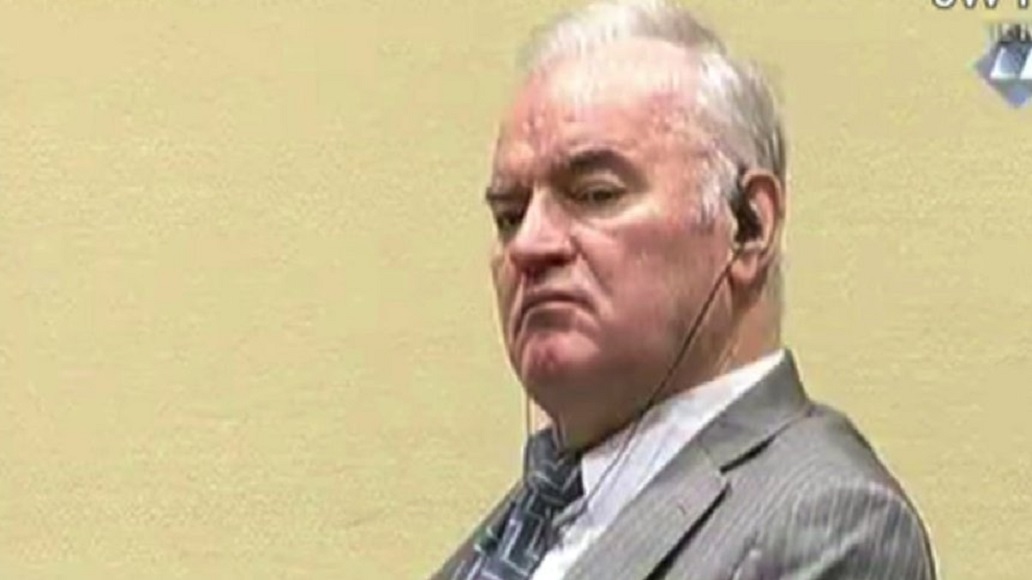In cooperation with FOMOSO, this article was also published on IBNA (balkaneu.com)
Mladen Dragojlović – On Wednesday, November 22, the UN body of the International Criminal Tribunal for war crimes in former Yugoslavia (ICTY), in the Hague, will hand down a penultimate ruling against the Republic of Srpska Army general, Ratko Mladić, the man accused for the greatest crimes in Europe after WWII. Seventy-four years old Mladić is accused of 11 counts including genocide, war crimes and crimes against humanity.
During the trial that lasted 523 days, the ICTY prosecutors questioned nearly 600 witnesses, added hundreds of pages of documents and cross-examined the defence witnesses. According to prosecutors, there is no doubt that Mladić’s guilt has been proven and that the Court will sentence the, once dubbed “The Butcher of Bosnia”, to most severe punishment.
On the other hand, the defence support that the guilt of the old General is shaky, since there is evidence based on which they are saying that Mladić was sincere when he, after Bosnian Serb troops overran Srebrenica, said that nobody would be harmed and that civilians could freely go to Tuzla, a city under the control of the Republic of Bosnia and Herzegovina’s Army (AR BiH). They claimed that crimes following those days were not committed under his command. Defence attorneys demanded the freedom for this old man.
Mladić came to prominence in the Yugoslav Wars (specifically in Croatia), but the Criminal Tribunal never accused him for crimes in that ex-Yugoslav republic. After he got to the general’s rank, he became the commander of the RS Army. It was well known that, because of a dispute with RS political leaders, mainly with Radovan Karadžić, he was not the favourite guest in the small city of Pale, near Sarajevo, where the RS government had its stronghold. After repeated attacks of AR BiH forces on the villages around the UN Protected Zone of Srebrenica (a safe enclave in Eastern Bosnia), Mladić headed the Serb forces which overran it.
What followed is considered as the worst act of mass murder in European history after WWII. According to Bosniak (Muslim) sources, more than 8,000 men, mostly aged 16 to 50 years old, were killed and buried in mass graves.
The verdict of the International Court of Justice in the case of BiH against Serbia, defined these events as genocide committed by soldiers and police forces of RS. After the war, when the ICTY prepared the indictment against Mladić, the ex-General disappeared somewhere Serbia. For the nearly 16 years rumours wanted him in Russia, Serbia, BiH, Montenegro or, even, in the U.S. In the end, he was arrested by the Serbian Special Forces in a small village Lazarevo, about 80 kilometres north of Belgrade.
Right after his arrest, it was obvious that he was very ill. Several times during the trial, the process had to be stopped and postponed due to his poor health. Somehow, the trial is almost over now and the verdict will be announced as one of the last acts of the ICTY which, after more than two decades, will close on December 31. The possible appeals will be considered by, the so-called, Mechanism which already deals with several similar cases, including Karadžić’s second instance verdict.
Possible verdicts
Right after the arrest, the case was clear to Serbs – Mladić was headed to the ICTY to be punished and this punishment would mean that the entire Serbian nation is guilty for genocide and the worst war crimes during the dissolution of former Yugoslavia. Also, the punishment will show who is guilty for the beginning of the war making the Bosniaks appear as the main victims.
Even before his arrest, thought, the Bosniaks called Mladić “Butcher of Bosnia”, blaming him for the Srebrenica killings. Regarding the upcoming verdict, they insist it should include other places in the RS, too. Places where other campaigns of genocide took place.
Mladić is quite unfortunate because of the discovery of a mass grave in the village Tomašica, near Prijedor, with more than 150 bodies of Bosniaks from the area, inside. This, for Bosniaks, is the clear evidence that genocide did not happen only in Srebrenica. Moreover, they claim that similar events happened in other cities too; cities such as Zvornik and Visegrad, where, according to them, a large number of Bosniaks were deliberately killed.
Right now, nobody except from the defence attorneys considers acquittal as a possible option. As they claimed at the Court, the evidence against Mladić is based on rumours without legal ground. As they think, there is further evidence that Mladić tried to keep his “officer’s honour” and warned the RS war leadership that some actions are not in accordance with the Geneva Convention. But, there is a record of Mladić’s voice during the bombing of Sarajevo heard ordering where the shells should be dropped.
Possible conviction aftermath
The biggest question in this case is “what will happen after Mladić’s trial”.
It is certain that Serbs in BiH will be unsatisfied and that they already expect the Court decision to be similar to the verdicts of every other RS Army soldier or person on the Serb side, involved in the war.
But, like in other cases that were tried in the past, for instance the first verdict in the “Karadžić” case when the former RS president was sentenced to 40 years in prison. Although small, there is a chance for violent demonstrations. The dissatisfaction regarding the verdict will possibly be directed to the foreign consulates in Banja Luka. But, in this case, most probably Belgrade events must be closely followed as anything happening there it is later happening also in Banja Luka (as has been the case in similar occasions of the past).
It is expected that the Bosniak citizens, the Bosniak side will benefit most from the verdict, feeling that justice has been done. Analysts say that the verdict will prove that the Republic of Srpska was established on the idea of genocide and ethnic cleansing, at last. Bosniak politicians will use the decision to demand the dissolution of the Republic of Srpska and then ask for the support of the U.S. and the European Union. Bakir Izetbegovic the son of the Bosniak war leader Alija Izetbegovic would finally see his dream and promise to his late father (that, one day, BiH will be a state without entities) coming true.
Also, it is possible that, after the second instance verdict, Bosniak political leaders accuse Serbia for a generalised genocide in BiH, since the first trial was concerned with Srebrenica crimes only. As the renewal of the first trial was unsuccessful, this time there might be a new genocide case connected with Tomasica, Prijedor, Zvornik, Visegrad and other places.
As always, there is a big “but”. Since Mladić’s defence and family claim that he is seriously ill and that the ICTY medical experts did not treat him in the best possible manner, the Serb general’s early death remains possibility. It is very unlikely that it will (this would happen) before (the coming) Wednesday but it could happen before the second instance verdict and the definite end of process. In that case, the verdict would leave a legal gap unanswered – is the guilt in the Mladić case proven or not?
Source of the picture: http://www.spiegel.de/politik/ausland/ratko-mladic-auf-den-spuren-des-schlaechters-vom-balkan-a-1179325.html






Leave A Comment